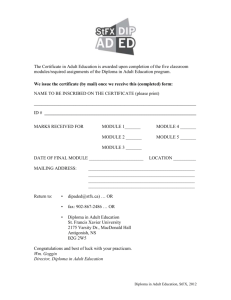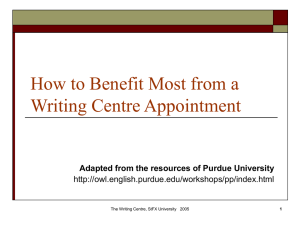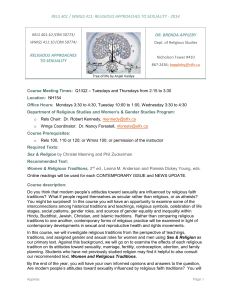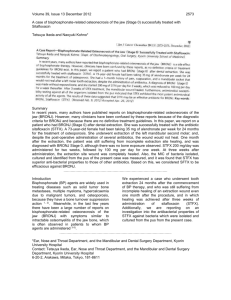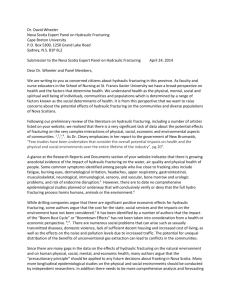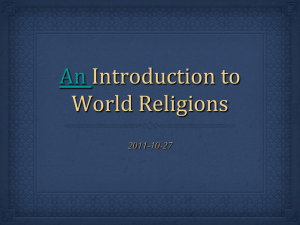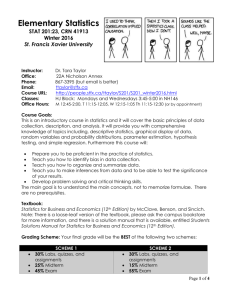Common Grammar Errors
advertisement
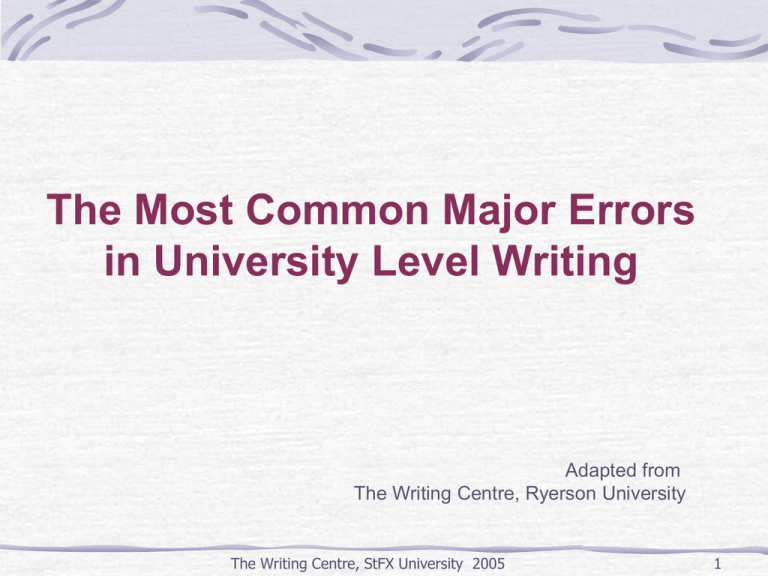
The Most Common Major Errors in University Level Writing Adapted from The Writing Centre, Ryerson University The Writing Centre, StFX University 2005 1 …Subject-Verb Agreement (Singular / Plural)… These tend to occur if the subject is separated from the verb by some descriptive words. The Writing Centre, StFX University 2005 2 …Subject-Verb Agreement (Singular / Plural)… EXAMPLE “The process of tabulating these results were begun by inputting the values into the spreadsheet.” What’s wrong? How do you fix it? The Writing Centre, StFX University 2005 3 …Subject-Verb Agreement (Singular / Plural)… CORRECTED “The process of tabulating these results was begun by inputting the values into the spreadsheet.” The Writing Centre, StFX University 2005 4 …Subject-Verb Agreement (Singular / Plural)… EXAMPLE “In 1820, there was new plans proposed for the site.” What’s wrong? How do you fix it? The Writing Centre, StFX University 2005 5 …Subject-Verb Agreement (Singular / Plural)… CORRECTED “In 1820, there were new plans proposed for the site.” The Writing Centre, StFX University 2005 6 …Sentence Fragment…. Part of a sentence is punctuated as a complete sentence. The Writing Centre, StFX University 2005 7 …Sentence Fragment…. EXAMPLE “During this planning time, when the final choice of a computer system is made.” What’s wrong? How do you fix it? The Writing Centre, StFX University 2005 8 …Sentence Fragment…. CORRECTED “During this planning time the final choice of a computer is made.” (You may also correct this by finishing the incomplete sentence.) “During this planning time, when the final choice of a computer system is made, you should consult with all the potential users.” The Writing Centre, StFX University 2005 9 …Sentence Fragment…. EXAMPLE “They came with a proposal. A proposal too good to refuse.” What’s wrong? How do you fix it? The Writing Centre, StFX University 2005 10 …Sentence Fragment…. CORRECTED “They came with a proposal, a proposal too good to refuse.” The Writing Centre, StFX University 2005 11 …Comma Splice or Run-on Sentence… Two separate sentences are joined with a comma, or run together without any punctuation. The Writing Centre, StFX University 2005 12 …Comma Splice or Run-on Sentence… EXAMPLE “The new buildings would be expensive, the estimated cost of renovating existing offices was half as much.” What’s wrong? How do you fix it? The Writing Centre, StFX University 2005 13 …Comma Splice or Run-on Sentence… CORRECTED “The new buildings would be expensive. The estimated cost of renovating existing offices was half as much.” or “The new buildings would be expensive and the estimated cost of renovating existing offices was half as much.” The Writing Centre, StFX University 2005 14 …Comma Splice or Run-on Sentence… How do you fix it? Sentence , Sentence You can use: • period • semi colon • comma plus “and” or “but” (a joining word) The Writing Centre, StFX University 2005 15 …Misuse of the Semi-Colon… The semi-colon (;) joins two sentences into one, without an and or but. This can be a very effective construction, but you must have a complete sentence on either side of the ; Therefore and however frequently begin the second sentence. The Writing Centre, StFX University 2005 16 …Misuse of the Semi-Colon… EXAMPLE “In 1886, 36,000,000 tonnes of cargo moved through the St. Lawrence Seaway; in contrast to the average of 11,000,000 tonnes in the 1950s.” What’s wrong? How do you fix it? The Writing Centre, StFX University 2005 17 …Misuse of the Semi-Colon… CORRECTED “In 1886, 36,000,000 tonnes of cargo moved through the St. Lawrence Seaway; in contrast, an average of only 11,000,000 tonnes moved through in the 1950s.” The Writing Centre, StFX University 2005 18 …Dangling Modifier… This occurs when a sentence begins with a verb form ending in -ing or -ed. This -ing or -ed word should refer to the subject of the sentence, which will usually follow the comma. The Writing Centre, StFX University 2005 19 …Dangling Modifier… EXAMPLE “By spending time with their children in play, the children can develop their language ability.” What’s wrong? How do you fix it? The Writing Centre, StFX University 2005 20 …Dangling Modifier… CORRECTED “By spending time with their children in play, parents can help them develop their language ability.” (It is the parents who are spending the time.) The Writing Centre, StFX University 2005 21 Pronoun Errors - Agreement Pronouns refer to nouns. Errors often occur when a pronoun does not agree with the noun that it is referring to or represents. The Writing Centre, StFX University 2005 22 …Pronoun Errors – Agreement… EXAMPLE One of the boys who was involved confessed to being at the scene. They said that it was only meant to be a prank. What’s wrong? How do you fix it? The Writing Centre, StFX University 2005 23 …Pronoun Errors – I or me?… Often writers confuse the proper use of “I” or “me” in the predicate of a sentence. The Writing Centre, StFX University 2005 24 …Pronoun Errors – I or me?… EXAMPLE “John went to the movie with Ann and I.” What’s wrong? How do you fix it? The Writing Centre, StFX University 2005 25 …Pronoun Errors – I or me?… CORRECTED John went to the movie with Ann and me. Hint: Split the compound phrase Ann and me John went to the movie with I. versus John went to the movie with me.) The Writing Centre, StFX University 2005 26 Word Confusion Some common examples… The Writing Centre, StFX University 2005 27 …Word Confusion Some common examples… where / were Where are you? Where asks about location. They were angry. Were is the past form of the verb “to be”. The Writing Centre, StFX University 2005 28 …Word Confusion Some common examples… there / their / they’re There is a . . . There indicates something exists. Put it there. There indicates location. (Hint: Remember where and there both refer to place and both have the same ending.) They argued their case. Their indicates possession. They’re going out together. There is short for They are. The Writing Centre, StFX University 2005 29 …Word Confusion… Some common examples Then / than Then she went to the store. Then indicates time. He is faster than his friend. Than indicates comparison. The Writing Centre, StFX University 2005 30 …Word Confusion… Some common examples too / to Try to sleep. To is the infinitive form of the verb. Go to the store. To is a preposition. He came too. Too means also. It was too late. Too is the comparative form. The Writing Centre, StFX University 2005 31 …Word Confusion… Some common examples its / it’s It’s not right it’s = it is The apostrophe means a letter is omitted. (Hint: Think of his, her, & its as a group. No apostrophe.) The dog found its bone. Its refers to possession. The Writing Centre, StFX University 2005 32 …Word Confusion… Some common examples would have / would of I would have come. Would of doesn’t exist. It’s just our slurring of have when we speak. wanna I wanna learn English. “wanna” is not a word! I want to learn English The Writing Centre, StFX University 2005 33
